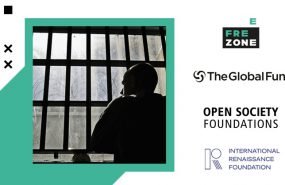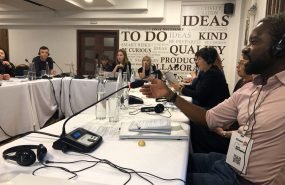Transition to the sustainability of HIV response in EECA region: regional approach
- 14.08.2018 13:29
- Post Views: 992
The aim of the session was to discuss and help the participants to better understand the situation in EECA region with regard to transition from the Global Fund’s support of HIV services for key populations to national funding, sustainability of such services, and the role of the regional HIV projects in this context. Next representatives from major SEECA regional and national networks shared their perspectives on the current situation with national ownership of HIV programs: Alexandrina Iovita, Human Rights Advisor, CRG Department, Secretariat of the Global Fund to Fight AIDS, Tuberculosis and Malaria; Andrey Klepikov, Executive Director, Alliance for Public Health (Ukraine); Gennady Roshchupkin, Community Health Systems Coordinator, Eurasian Coalition on Male Health (ECOM); and Ana Filipovska, SEE RCM Coordinator.
The participants of the session have discussed that the process of transition to domestic funding has started in CEECA several years ago, and now it is possible to identify several major themes around which the civil society concentrates its efforts: ARV price reduction (needed to reduce wastage of resources and put more people on treatment with the state amount of allocations); increasing the volume of domestic funding for social contracting mechanisms for HIV-service NGOs; mobilization of more funding because otherwise the region isn’t likely to reach its targets for HIV. And there are already encouraging experiences do exist in the region in almost each of these areas: in aspects of reducing pricing of medications for ensure that treatments reach more people (e.g. Ukraine), importance to work with the city and regional levels (e.g. Kyiv, Odessa, Almaty), developing mechanisms for government to contract NGO services for key populations (social contracting) in addition to the concerted efforts to allocate funding for these services (e.g. in Macedonia). The factors in this work is solidarity, learning from bad and good practices including from SEE, using international organization engagements until it is there including WHO.
But even with some positive changes happening now in these areas, the Global Fund and other international donors should have longer-term and nuanced transition policies, which will help prevent ruining community systems on the national and regional levels that still almost fully rely on their support.
The Global Fund has been supporting regional projects in EECA which address sustainability. There have been concerns how to make these regional efforts more effective. At the moment of the session, the Global Fund still was in the final stages of its decision which regional proposal on HIV will be selected for their support in 2019-2021; such long process was related to some concerns over strengths and weakness of all the proposals received. The decision to support the application submitted by the Alliance for Public Health and Ukrainian Union of People living with HIV was announced by the Global Fund the next week after the conference. In case of TB, the decision was taken a month ago, it will be the continuous support for the TB-REP project.
Related News
On-line conference ‘Prisons in COVID context: how community health systems work in EECA region’
We are pleased to invite you to the on-line conference ‘Prisons in COVID context: how community health systems work in EECA region’ that will take place on July 24th.The event is initiated by FREE ZONE and co-hosted by The Global Fund to Fight AIDS, Tuberculosis and Malaria and Open Society Foundations. Post Views: 1,174 Read moreWebinar «Opportunities for civil society and TB communities from EECA region within the Global Fund Allocation Cycle 2020-2022»
On May 15:00 form 3 pm to 4:30 (Kyiv time) TB Europe Coalition will held the second webinar from a series of webinars – «Opportunities for civil society and TB communities from EECA region within the Global Fund Allocation Cycle 2020-2022» Post Views: 905 Read moreReport: “Consultation and Regional Forum on the Provision of Global Fund-related Technical Assistance for CSOs and communities in the EECA region – how to make it work better?”
This report describes the status of the Global Fund Community, Rights and Gender Technical Assistance Programme (CRG TA Programme) and other related support and provides options about how to improve these opportunities and their utilisation in Eastern Europe and Central Asia as on November 2019. Post Views: 1,002 Read moreServices for migrants and refugees from Ukraine – HIV/TB care with a focus on key populations
Due to the increasing flows of refugees from Ukraine because of Russia’s invasion of Ukraine, the EECA Regional Platform created a spreadsheet to fill contacts details of face-to-face and online services for refugees and migrants (with a focus on HIV/TB care and key population groups).
Regional Platform – EECA
This web-resource is a part of new regional communication and coordination project “Regional Civil Society and Community Support, Coordination and Communication Platform - EECA”, implemented by Eurasian Harm Reduction Association (EHRA).
Tags
See also
-
Grant Cycle 7 Reprioritization: How can communities prepare? 02.07.2025 12:03
-
Webinar: Using Global Fund's Data for Advocacy 12.06.2025 12:00
-
GC7 Grant Reprioritization: Updated Timelines 10.06.2025 14:37







